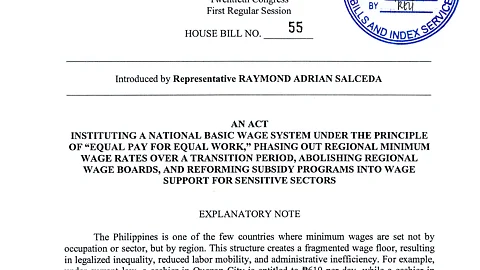
- NEWS
- the EDIT
- COMMENTARY
- BUSINESS
- LIFE
- SHOW
- ACTION
- GLOBAL GOALS
- SNAPS
- DYARYO TIRADA
- MORE

A group of neophyte lawmakers in the House of Representatives is being formed to collectively push for the passage of a bill that would abolish the regional wage boards and establish a uniform daily pay for both Metro Manila and provincial workers.
House Bill 55, or the proposed “Equal Pay for Equal Work Act,” aims to close the gap between the daily take-home pay of private employees in Metro Manila and the province by instituting a standard or national basic wage. This suggests that provincial workers, regardless of their region, would get the same daily minimum wage as those in Metro Manila.
The current daily minimum salary for private workers in Metro Manila is pegged at P695 following the National Capital Region Regional Tripartite Wages and Productivity Board (RTWPB)’s approval for a P50 increase on 30 June. The rate adjustment took effect on Friday, 18 July.
Each region has RTWPB — created under the Wage Rationalization Act (RA 6727) — which prescribes the minimum wage rates. The rates depend, however, on the cost of living in each area. Studies and consultations help the RTWBP in determining and setting the daily minimum wage per region.
Due to the lower cost of living in most provinces compared to the NCR, provincial workers receive lower wages than those in Metro Manila despite performing similar labor. The Bangsamoro Autonomous Region in Muslim Mindanao has the lowest minimum wage at P361, relatively lower than the economic think tank IBON Foundation's estimated daily family living wage of at least P1,200.
Albay Rep. Raymond Adrian Salceda — the bill’s proponent — said it is high time to put an end to this “regional disparities” by establishing a single national basic wage as the statutory floor applicable across all regions.
He bared that there is an ongoing discussion between first-term lawmakers to form a coalition dubbed “Fair Wage Bloc” that would help muster support for the bill to advance in Congress.
“We are already talking to other freshmen. I do not have to lead this. What matters is that we have a bloc, formal or informal, that consistently pushes this forward,” he said Monday. “I expect this bloc to have a good enough number.”
If passed into law, wages in each region shall be gradually adjusted each year for five years until they conform to the set national basic wage.
The RTWPB will then be abolished upon the full implementation of the national basic wage in the fifth year, with the National Wages and Productivity Commission (NWPC) taking over. The NWPC, together with the Department of Labor and Employment, will determine the initial national basic wage based on socio-economic assessments and tripartite consultations.
Each region must add at least 1/5 of the gap between their current wage and the national wage each year, and in the sixth year, the minimum wage will be uniform throughout the country.
The proposal will also mandate the government to provide a subsidy for sensitive sectors and qualified employers to help them adjust to the national basic wage. This may be in the form of a direct wage top-up, social security premium subsidy, or payroll reimbursement.
Aside from a standard minimum wage, Salceda disclosed that other pro-labor reforms under discussion by the bloc include wage parity and equal pay protections for women and vulnerable workers, expanded social protection, including healthcare, unemployment insurance, and maternity benefits, among others.
Lawmakers in previous Congresses had called for the abolition of the RTWPB in favor of a single wage-setting body, citing its failure to effectively deliver reasonable living wages.
